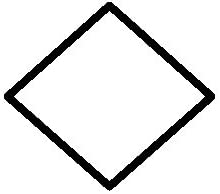The speed restriction in a residential area is 25 miles per hour unless otherwise specified.
You've been in a small traffic mishap with a parked car and can't seem to locate the owner. You must leave a note on the vehicle and immediately report the accident to the city police or the CHP in unincorporated regions.

A warning sign in the shape of a diamond.
When two solid yellow lines separate oncoming traffic and designate the middle of the road, passing is prohibited in both directions.
YOU'RE ON A HIGHWAY WITH TWO TRAFFIC LANES DIRECTLY IN FRONT OF YOU, AND YOU SEE A VEHICLE STOPPED ON THE RIGHT SHOULDER OF THE ROAD AHEAD WITH HAZARD LIGHTS ON. YOU SHOULD SLOW DOWN and proceed with caution.
ON ONE-WAY STREETS AND EXPRESSWAY RAMPS, THIS SIGN IS USED TO PREVENT WRONG-WAY ENTRY.
Low beams should be used when driving in fog.
Advertisement
When merging into the freeway, you should be traveling at or near the same pace as the freeway traffic.
Under no circumstances is it legal to block an intersection.
A SINGLE BROKEN WHITE (OR YELLOW) LINE MAY NOT BE CROSSED. When doing so would cause traffic congestion.
Your car was recently sold. Within 5 days, you must inform the DMV.
When parking uphill next to a curb, you should turn your front wheels away from the curb.
The 25 MPH speed limit in residential areas aims to prioritize the safety of residents, especially children and pedestrians, by promoting slower vehicle speeds. This helps reduce the risk of accidents and allows drivers more time to react to potential hazards.
A red arrow pointing to the right on a traffic light indicates that you are not allowed to turn in that direction until the light turns green. When the red arrow is illuminated, it means that right turns are prohibited, and you must wait until the signal changes.
Advertisement
Some jurisdictions may impose a maximum jail sentence of up to six months for driving with an excessive BAC, the actual sentence can be influenced by several factors. These factors may include prior DUI convictions, aggravating circumstances (such as accidents or injuries caused), and the specific legal provisions of the jurisdiction where the offense occurred.
At an intersection with a flashing yellow signal light, you should slow down and proceed through the intersection with caution.